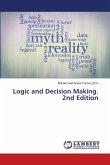We all know what universalis are-they are general ideas, notions intended to encompass all concrete things. Table is the universale that covers all tables ever manufactured; triangle includes all triangles ever designed (or yet to be designed); good, as a universale, refers to all good things that have ever existed, and so on. However, we propose to reduce the definition of universalis to a more fundamental principle: they represent a refusal to count. In other words, a universale abstracts from individual enumeration and focuses instead on the generality of form. This perspective allows us to clarify their role in the origin of antinomies, the problem of skepticism, and other philosophical paradoxes. Approaching universalis in this way may shed new light on several longstanding questions in philosophy.
Bitte wählen Sie Ihr Anliegen aus.
Rechnungen
Retourenschein anfordern
Bestellstatus
Storno








